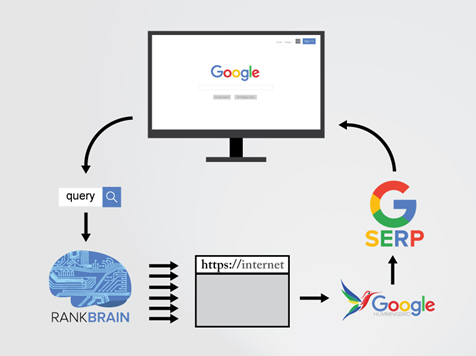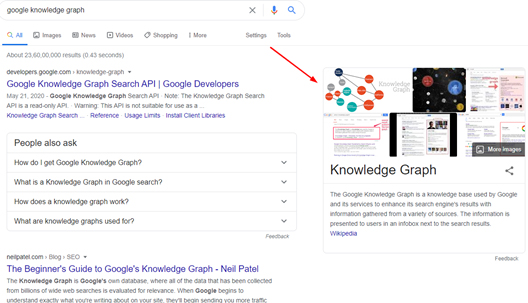Before the Covid-19 pandemic made the news and topics of discussion in the corporate circles, the buzz was all about artificial intelligence (AI) and how it is pervading all aspects of business. It has helped automate manufacturing and enabled organizations to provide better customer care. As digital marketing companies would testify, search engine optimization (SEO) has also come under the influence of AI.
AI has already influenced SEO significantly, particularly in how search engines detect the right search results to put up in the SERPs in accordance with the search query.
Machine Learning through RankBrain

(Img URL: https://www.wordstream.com/blog/ws/2015/11/04/rankbrain)
Google has been incorporating machine learning. A glowing example is RankBrain, a machine learning system that was incorporated into the Hummingbird algorithm back in 2015.
The Hummingbird update dates back to 2013 and was designed to incorporate semantic search, whereby the search engine figures out the intent of the user behind each search query.
(Img URL: https://www.searchenginejournal.com/google-algorithm-history/hummingbird-update/)
For that, the update would understand the context behind each query. So, Google could consider associated words and synonyms rather than the exact contents of the query to deliver the best results. That would prevent search marketers from resorting to keyword stuffing without enriching their content with rich meaning and genuine information. It was designed to avoid the situation many of us have, when we really never used to get the information we were looking for, instead we would just get results containing content with words that mimicked what we typed in the search box.
How RankBrain Made Search Results More Accurate
The RankBrain modification enabled Google to examine vast sections of search information to improve how it interprets search phrases. These particularly helped when users typed lengthy search phrases or long tail keywords. They would be lowered to a manageable size that the algorithm could effectively deal with. The update is keeping on enhancing and improving itself. The self-enhancing happens based on insights gleaned from machine learning.
In future, there could be more AI- and machine learning- based improvements to help algorithms update themselves. This can replace introducing updates after updates, and it’s also more cost effective. Going ahead, we could see AI developments to analyze the content quality and the hyperlinks that search optimizers produce.
AI Could Help Return More Customized Results
We have seen Google’s efforts to personalize search outcomes for users based on their geographic location. The results could also differ on the basis of the users’ search history and the demographic information that Google collects about you. This was something new back then, but it no longer seems strange. Still, these efforts are restricted now. These could expand further with AI. And Google could use AI for making deeper predictions about search behavior on the basis of historic searches. We already see smart search suggestions while typing in the search box. With AI, Google could predict search outcomes faster by studying the search information and patterns of millions of users.
This could benefit online marketers if they make use of these predictive searchers to better understand user behavior. The marketer that succeeds the most in this could have a significant advantage over the competition. But it may also add to the complexity of Google’s search algorithms, and make it tough for search marketers.
AI for a More Interactive Search Experience
Google has also made its search page more interactive and richer in information, so much so that people looking for information don’t need to click the links in the search listings but get all the information they want right from the SERPs. Snippets and Knowledge Graph are examples.
Quite like how RankBrain helps Google understand the semantic aspect of search queries, AI could be used to make the search results page more interactive and inclusive of the kind of information the user is looking for. That, of course, raises the challenge for search marketers.
Search marketers need to remember that the future is all about improving user experience and fulfilling their requirements. That is Google’s goal, and it will be using artificial intelligence to get to that.
Content Quality and Openness to New Strategies
Businesses would need to deliver comprehensive, relevant and engaging content through their web pages and blog posts, because the AI-powered search knows exactly what users need and the context of their search. You can also optimize for long tail keywords and conversational search queries because that’s how people search these days, particularly when they use voice search to search using their voice assistants and mobile phones.
Experienced website designing and digital marketing services can help various kinds of businesses to be relevant and conspicuous in the search pages and online spaces despite the stiff competition by other businesses. Being prepared to adopt new technologies and strategies to live up to the standards of smart, AI-powered search engines will determine SEO success in the future.






